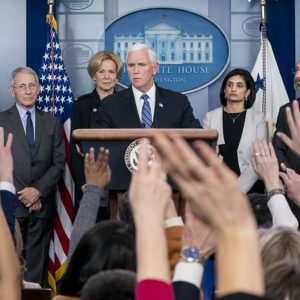Sunshine Week, the annual nationwide celebration of access to government information, was March 15-21.
Like almost everything else, the coronavirus pandemic has affected the open government community and government entities’ plans to highlight the public’s right to know. Openness forums and events were moved online or in some cases, canceled.
As Sunshine Week activities were shut down, the pandemic is also a sobering reminder of the importance of transparency in our government year-round. In this time of crisis, Americans deserve the most accurate information from our government about the spread of the virus and our readiness to address it.
A critical tool to rollback government secrecy is the Freedom of Information Act (FOIA). The law gives anyone the right to request information from federal, state and local government entities.
For example, when the coronavirus initially spread to the United States, concerns about conflicting information from top Trump administration officials, including the availability of tests for diagnosis, were compounded by blatant attempts to control the narrative by a White House clampdown on information sharing by health experts.
Rather than providing citizens with accurate information about the pandemic at a time when access to accurate information might have helped curb the outbreak, our government’s response to the crisis grew even less cohesive or transparent.
In fact, recent reporting revealed the White House had ordered federal health officials at the Department of Health and Human Services to make coronavirus meetings classified, excluding critical health experts who did not possess security clearances and preventing critical information from being shared.
In response to this unbridled and unwarranted secrecy, Open The Government, Union of Concerned Scientists and the Government Accountability Project filed FOIA requests with government agencies that are dealing with the outbreak. The objective of these expedited requests is to learn more about how much our government knew about the coronavirus crisis and whether stifling information from qualified health experts delayed an appropriate response to the crisis.
FOIA success stories of the past year offer openness advocates, journalists, litigators and grassroots organizations reason to be optimistic that our efforts to unlock information about the government’s response to the virus will yield results.
Last September, documents received in response to FOIA requests uncovered how Trump’s misleading statements and altered forecast map concerning Hurricane Dorian, which caused the U.S. an estimated $5 billion in economic loss and damages and decimated the Bahamas, confounded officials and top-ranking scientists at the National Oceanic and Atmospheric Administration.
The records show NOAA officials wrestling to keep politics out of science and trying to avoid eroding the public’s trust in the Sharpiegate controversy that ensued.
Another public records request project looking into how police departments use facial recognition on Americans revealed information about a start-up, Clearview AI, that’s scraping billions of images from social media sites and selling them to law enforcement agencies without the public’s knowledge or consent.
The revelation generated international news coverage and resulted in at least one state, New Jersey, barring its police officers from using the company’s face recognition app. Congressional queries about the product and lawsuits against the company in federal courts are continuing.
That same public records project also brought to light information about another company, Special Services Group, pitching to law enforcement agencies cameras that can be hidden in the most unusual spots including tombstones, vacuum cleaners, baby car seats. As more individuals participate in the project and investigate the use of surveillance technology in their backyards, people will be able to expose more incidents of government secrecy.
On the immigration enforcement front, documents obtained through FOIA requests made by environmental and civil rights advocacy groups revealed that to satisfy the need for additional capacity resulting from the Trump administration’s “zero tolerance” policy, the Department of Homeland Security considered detaining migrants and migrant families, including up to 7,500 unaccompanied minors, at a toxic waste site.
And just this month, a federal judge had stern words for U.S. attorney general Bill Barr’s handling of the Mueller Report in a favorable ruling for a FOIA request and subsequent lawsuit that sought a full-version of the text. The judge also ordered the Department of Justice to privately verify for him the appropriateness of the redacted parts of the report and determine whether additional information should be released to the public.
In time, we will learn more about how our government has handled the coronavirus from behind the scenes. As with other epidemics including SARS, MERS, Zika virus and swine flu, the coronavirus outbreak will eventually dissipate, but our democracy will remain.
The coronavirus pandemic presents a solemn opportunity to reaffirm Americans’ right to access life-saving information, and we must protect and exercise that right all year round to ensure greater transparency and accountability in our government.

